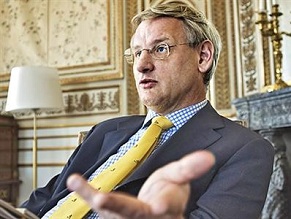|
World Jewish News

In Luxembourg, Swedish Foreign Minister Carl Bildt said the alleged story in Haaretz daily had been “fed by the Israeli Ministry of Foreign Affairs”.
|
Israeli envoy to Sweden summoned to explain foreign ministry ‘slander’ of government’s objections to Iran sanctions
15.10.2012, Israel and the World Israel’s Ambassador to Sweden Isaac Bachman was called to an emergency meeting at the Swedish foreign ministry in Stockholm on Monday to explain media reports Sunday claiming Sweden was to object to proposed further sanctions on Iran at a meeting of the EU Foreign Ministers in Luxembourg.
Reports, published in Israeli daily Haaretz and which were attributed to an "unnamed Israeli foreign ministry official," implied the Swedish government was scared that increased economic pressure on the Iranian regime might compromise the future of a series of recent agreements between Swedish telecommunications giant Ericsson and Tehran.
Slamming the claims as “anonymous slander” ahead of the Luxembourg talks, Swedish Foreign Minister Carl Bildt said the alleged story had been “fed by the Israeli Ministry of Foreign Affairs”.
Slamming the apparent leak, he said “I don’t think anonymous slander is the way we should conduct relations between responsible countries.”
“I think it says more about those responsible for that slander than anything else,” he added.
Despite the claims, proposals to ramp up sanctions on the Iranian regime were approved by the EU ministers, a decision which required unanimity of all 27 EU member states, seemingly supporting Bildt’s insistence the accusations were “science fiction”.
The scenario, which he further described as “unacceptable diplomatic conduct”, threatens to increase already evident tension between Sweden and Israel, following a period of unease in the Scandinavian country, which has been the scene of various anti-Israel and anti-Semitic demonstrations.
Last month, some 1,200 people attended a pro-Israel rally in Stockholm, which was opposed by counter-protest from pro-Palestinian groups, despite its peaceful nature. Sweden has seen a surge in hate crimes since Israel’s invasion of Gaza in 2009, which has led to criticisms of the government’s mechanism for handling anti-Semitic incidents.
In one of the latest of these incidents, an explosion was sounded at a Jewish centre in Malmo, in the South of the country last month, destroying in part the entrance to the building. Malmo, Sweden’s third-largest city, has seen the majority of harassment of Sweden’s Jewish population occur on its turf, with 400 anti-Semitic incidents reported in the city in 2009 alone.
Last year, in response to an open letter by the Simon Wiesenthal Centre calling on the administration to establish public funds to help the Jewish community to set up security measures for communal facilities, the government allocated four million kroner ($621,000, €440,000) of its 2012 budget to protect the Jewish community.
Announcing the initiative, Integration Minister Erik Ullenhag issued a statement saying “public funds are needed in the form of a one-off sum to increase security and reduce the vulnerability of the Jewish minority in society”, adding that “anti-Semitic remarks and other negative treatment based on racial assumptions is never acceptable in a democratic society”.
The government has revealed studies showing that “while tolerance is increasing in society, anti-Semitic views have not decreased at the same rate”. “Some Jews in Sweden choose not to reveal that they belong to the Jewish minority out of fear,” it added.
According to the Council of Swedish Jewish Communities, there are some 20,000 Jews living in Sweden, predominantly in Stockholm, Gothenburg and Malmo. Most Swedish Jews are descendants of pre-war refugees and of Holocaust victims.
EJP
|
|
